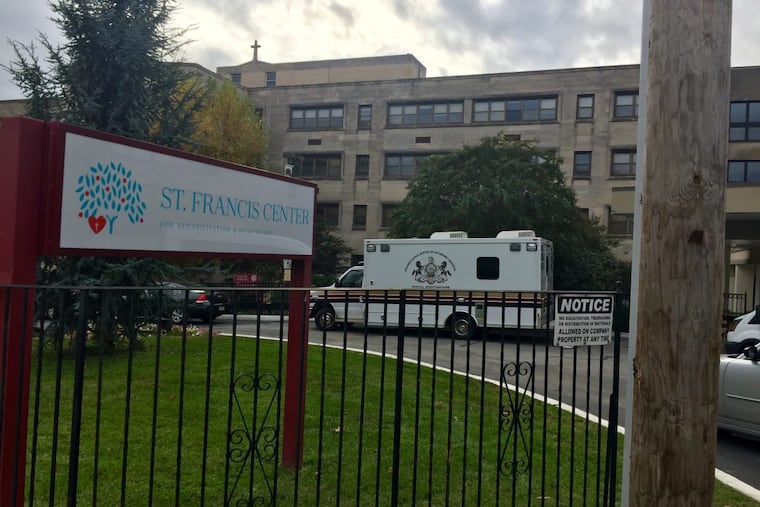St. Francis nursing home in Darby fined $782K for deficient care
The center was dealt major fines this month for deficiencies in care found during inspections in January and August. In addition, the Delaware County facility received a provisional license to continue operating after having received a license revocation notice in September.

St. Francis Center for Rehabilitation & Healthcare in Darby was fined a total of $782,250 this month for deficiencies found during inspections in January and August, Pennsylvania Department of Health records show.
A fine for $675,750, stemming from an August inspection that found that a patient had developed "wounds that went down to the bone with exposed tendon" and resulted in revocation of St. Francis' license, is among the 10 largest fines nationally during the last three years, according to the latest federal data on nursing-home penalties.
Regulators also levied a $106,500 fine for deficiencies found in January, including the failure for 12 hours to provide pain medications to a patient admitted after major surgery and other failures to properly administer medications, resulting in actual harm to patients.
"St. Francis was unable to provide comment," a spokeswoman said Tuesday. She also declined to say whether St. Francis will appeal the fines.
On Dec. 18, the Delaware County facility, which has 273 beds and is one of six centers sold in 2014 by the Archdiocese of Philadelphia to Center Management Group of New York, succeeded in its appeal of the license revocation and received a six-month provisional license.
With the provisional license, St. Francis is allowed to resume admitting new patients. Regulators had banned it from doing so since September. During the August inspection, St. Francis had 258 residents, a figure that had fallen to slightly more than 200 on Oct. 20. The spokeswoman would not say how many residents St. Francis now has.
Agents from the Pennsylvania Attorney General's Office raided St. Francis on Nov. 1, carrying out records and interviewing residents and their family members about the care they were receiving.
The fines against St. Francis, issued Dec. 15, came as the nursing-home industry appears to be making headway in a push-back against a surge in financial penalties toward the end of the Obama administration.
"The use of [civil monetary penalties] is out of control" and "strangling the industry," Mark Parkinson, president and chief executive of the American Health Care Association and National Center for Assisted Living, wrote in March to U.S. Department of Health & Human Services Secretary Tom Price.
HHS's Centers for Medicare and Medicaid Services, which regulates nursing homes, issued a series of guidance documents during the summer and fall that ratcheted back some of the enforcement practices the nursing-home industry found most troubling.
Under the old guidelines, certain fines for severe infractions would accumulate on a daily basis until inspectors revisited the facility to see that the problem was fixed. Proposed guidelines, issued Oct. 27, "creates the assumption that CMS will lower per day [civil monetary penalties] for immediate jeopardy deficiencies prior to a revisit," according a comment on the new rules by the Center for Medicare Advocacy.
In addition, the proposed guidance gives CMS regional offices more leeway to decide whether a facility should be fined immediately for an incident that could have resulted in death or serious injury but resulted in no harm to the patient.
That change is also a bad idea, the Center for Medicare Advocacy, a Washington nonprofit, said, noting, "The reason for having an enforcement structure is to prevent injury from ever occurring through a process of inspection, citation, and imposition of penalties."
Even on a state level, nursing-home enforcement appears to be in flux.
In the first four months of this year, Pennsylvania regulators fined nursing homes a total of $796,750, more than the $639,500 total for the three years ended Dec. 31, 2016. The state imposed 95 fines this year through April. But from May through November, the state levied just two fines for a total of $18,000.
A Pennsylvania Department of Health spokeswoman did not respond to a request for an explanation of the decline in fines.
It is unclear whether the fines levied against St. Francis were state or federal penalties.